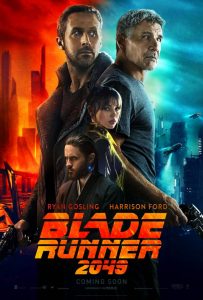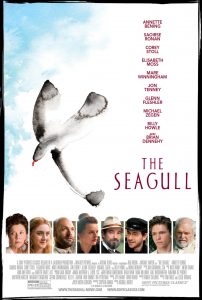The anticipation around Blade Runner 2049 has been palpable. Given the original’s reputation as one of the most revered films of all time this is not particularly surprising. But in the assured and adept hands of director Denis Villeneuve (whose flair is evident in films Prisoners, Sicario and Arrival) the film does not disappoint. It emphatically succeeds on practically every level, building on the original’s most recognisable elements – particularly its cinematography and score – and extending the narrative in intriguing ways. The film also preserves its predecessor’s immersive atmosphere and cool, almost clinical style. It is executed with meticulous and consummate skill – a rare sequel which renews and reinvigorates whilst remaining faithful to its roots.
Taking place thirty years after the original, replicants are now being manufactured by another company headed by Niander Wallace (Jared Leto). In response to the rebellions initiated by the earlier models, these replicants have been engineered to be more obedient. K (Ryan Gosling), a newer model, is an LAPD officer tasked with tracking older fugitive replicants. When he tracks down a replicant hiding on an isolated bioengineering farm, he unearths evidence that steers him toward discoveries that could irrevocably change the relations between humans and replicants. Pursuing a series of clues, memories and coincidences, he is eventually lead to blade runner Deckard (Harrison Ford), thereby intertwining the narrative with the original’s storyline whilst extending and deepening its themes in provocative ways.
The screenplay by Hampton Fancher and Michael Green is lean and taut, revealing plot details with an elegant economy. We are kept engrossed by dialogue which creates a tantalising distance latent with possibility and, perhaps more importantly, ambiguity. The performances are all terrific, but the film no doubt revolves around Gosling. He infuses his performance with his distinctive brand of quiet, brooding intensity (perhaps most evident in his work with director Nicolas Winding Refn, in particular Drive). This sort of minimalist performance is a difficult balancing act to pull off, especially when K undergoes his own existential crisis. He must reveal shades of vulnerability, of doubt, almost exclusively through nuanced subtleties in facial expression. Here, Gosling excels.
The film also thrives in immersing the senses. In frame after frame, Roger Deakins’ cinematography is consistently superb. Much like the original, mood is paramount. A dark and blurry colour palette permeates throughout, but this time visual cues – reflections, silhouettes, shadows – seem to more conspicuously distort and call into question the boundaries of the ‘human’. Additionally, whilst the film also contains Vangelis’ iconic score of the original, composers Hans Zimmer and Benjamin Wallfisch’s score – a visceral, potent mix of dread-infused bass and enigmatic strings – repeatedly generates an unnerving tension. The result is a film with a bold, searing, uncompromising vision of a future which, with recent revolutionary advancements in genome editing technologies, seems increasingly closer to becoming a possible reality.
The word ‘classic’ is thrown around too casually, too uncritically, these days. There are so many factors, beyond the merits of the film itself, which affect whether it will become a classic. Only time will tell. What is unmistakable, however, is that Blade Runner 2049 is a highly accomplished feat – a film in almost complete control of its craft. And this, alone, makes it a rarity cause enough to celebrate.
Blade Runner 2049 is in Australian cinemas from 5th October through Sony Pictures.





